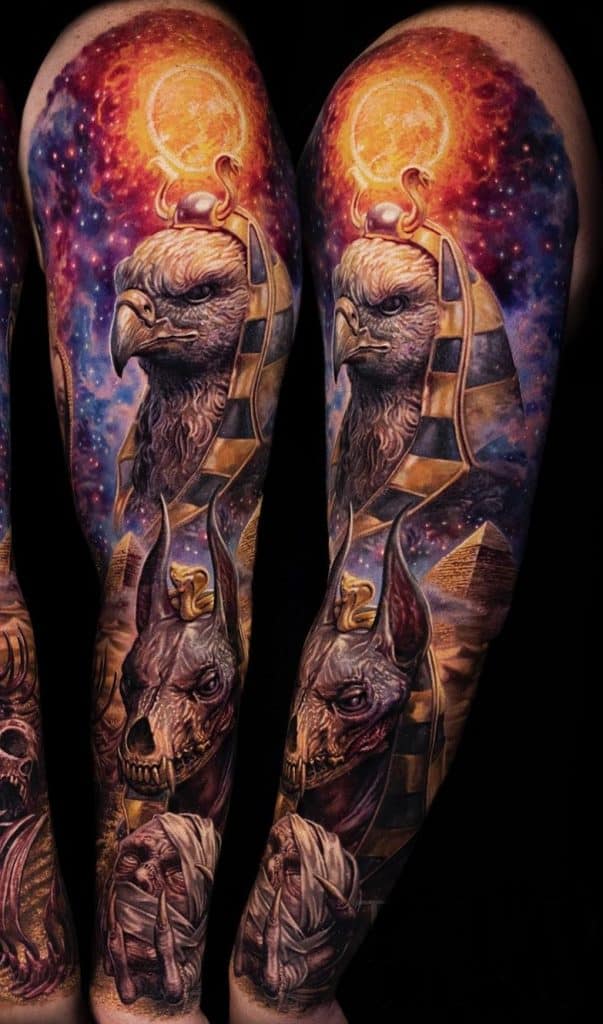Tattoos have long been a powerful form of self-expression, allowing individuals to adorn their bodies with meaningful symbols and artwork. Among the vast array of tattoo designs, the Anubis tattoo holds a unique and captivating presence, often chosen for its rich symbolism and ancient roots. In this article, we delve into the depths of the Anubis tattoo, exploring its historical significance, cultural interpretations, and the various meanings it can hold for those who choose to ink this majestic deity onto their skin.
The Mythical Anubis: A Guardian of the Dead

Anubis, often depicted as a jackal-headed deity, is a prominent figure in ancient Egyptian mythology. His role as the guardian of the dead and protector of tombs is deeply intertwined with the Egyptian beliefs about the afterlife. Anubis is believed to have been the one who guided souls through the treacherous journey to the afterlife, ensuring their safe passage and fair judgment.
The origins of Anubis can be traced back to the early dynastic periods of ancient Egypt, where he was revered as the patron god of embalming and mummification. His association with the jackal, an animal commonly found near cemeteries, further solidified his connection to the realm of the dead. Over time, Anubis evolved into a complex deity, embodying not only death but also rebirth, protection, and the balance between life and the unknown.
The Anubis Tattoo: A Symbol of Empowerment

For those who choose to adorn themselves with an Anubis tattoo, the meaning goes beyond the surface. It is a powerful statement of one’s connection to ancient wisdom and a reminder of the cycle of life and death. Here are some common interpretations and personal meanings associated with Anubis tattoos:
The Guardian Within
Anubis is often seen as a guardian figure, and individuals who resonate with this aspect may choose to tattoo Anubis as a symbol of protection. This can represent a personal guardian, someone who watches over them and guides their path, offering strength and courage during challenging times. The Anubis tattoo becomes a reminder of one’s inner resilience and the belief that they are never truly alone.
Embracing the Cycle of Life
The ancient Egyptians viewed death as a transformative journey, and Anubis, as the guide of souls, embodies this transition. People who choose Anubis tattoos may see it as a representation of their acceptance of life’s cycles. It serves as a visual reminder that death is not an end but a new beginning, a belief in the eternal soul, and a celebration of the beauty found in both life and its eventual passing.
Connection to Ancient Wisdom
The Anubis tattoo can also be a tribute to the rich history and ancient wisdom of Egypt. Those who appreciate the intricate symbolism and mythology of ancient cultures may find deep meaning in this tattoo. It becomes a personal talisman, a connection to a time when beliefs and rituals were deeply intertwined with daily life, and a way to honor the cultural heritage of one of the world’s oldest civilizations.
| Tattoo Placement | Symbolism |
|---|---|
| Upper Arm | Strength and Protection |
| Back | Inner Power and Resilience |
| Chest | Embracing Life's Journey |
| Leg | Overcoming Obstacles |

Design Variations and Cultural Context
Anubis tattoos come in various artistic styles, each bringing its own unique interpretation. From traditional Egyptian-inspired designs with intricate hieroglyphics to modern minimalist interpretations, the versatility of Anubis tattoos allows individuals to express their personal style while maintaining the essence of the deity.
It's important to note that the Anubis tattoo, like all cultural symbols, should be approached with respect and cultural sensitivity. The meaning and significance of Anubis in ancient Egyptian culture should not be appropriated or trivialized. Those choosing to get an Anubis tattoo should educate themselves on the rich history and symbolism behind this deity to ensure an authentic and respectful representation.
Conclusion
The Anubis tattoo is more than just a striking visual; it carries a profound message that resonates with the individual wearing it. Whether as a guardian, a symbol of life’s cycles, or a connection to ancient wisdom, the Anubis tattoo serves as a powerful reminder of the complexities and mysteries of existence. It is a testament to the enduring power of ancient Egyptian mythology and its ability to inspire and guide individuals even in modern times.
Why is Anubis depicted with a jackal head?
+Anubis is often associated with the jackal due to the animal’s frequent presence near ancient Egyptian cemeteries. The jackal, with its nocturnal habits and keen senses, represented the unknown and the transition between life and death, making it an apt symbol for the guardian of the dead.
What are some other interpretations of Anubis tattoos?
+Anubis tattoos can also symbolize a personal journey of transformation, the overcoming of fears, or a connection to the spiritual realm. The interpretation is highly personal and can vary based on an individual’s life experiences and beliefs.
Are there any cultural considerations when getting an Anubis tattoo?
+Yes, it’s important to approach Anubis tattoos with respect for ancient Egyptian culture. Researching the symbolism and ensuring an accurate and respectful portrayal is essential. Some individuals may choose to consult with experts or tattoo artists who specialize in cultural tattoos to ensure authenticity.